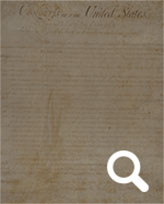Tonkin Gulf Resolution
Tonkin Gulf Resolution
By 1964, Vietnam had been torn by international and civil war for decades. U.S. military support for South Vietnam had grown to some 15,000 military advisers, while the North received military and financial aid from China and the Soviet Union.
In a late-night televised address on August 4, 1964, President Johnson announced that he had ordered retaliatory air strikes on the North Vietnamese in response to reports of their attacks earlier on U.S. naval ships in the Gulf of Tonkin. He asked Congress to pass a resolution stressing that “our Government is united in its determination to take all necessary measures in support of freedom and in defense of peace in southeast Asia.”
The resolution passed quickly on August 7, with only two dissenting votes in the Senate. It stated that “Congress approves and supports the determination of the President, as Commander in Chief, to take all necessary measures to repel any armed attack against the forces of the United States and to prevent further aggression.”
The resolution became the subject of great political controversy in the course of the undeclared war that followed. As public resistance to the war grew, Congress eventually repealed the resolution in January 1971. More than 58,000 U.S. military personnel were killed in the war.
This document was on display in the “Featured Documents” exhibit in the Rotunda Galleries of the National Archives in Washington, DC, July 15 through August 7, 2014.
The National Archives Museum’s “Featured Documents” exhibit is made possible in part by the Foundation for the National Archives through the generous support of Toyota.
Past Featured Records
-
The Emancipation Proclamation and Juneteenth
Milestones in the long struggle for American freedom
Emancipation Proclamation
President Abraham Lincoln issued the Emancipation Proclamation on January 1, 1863, as the nation approached the third year of the Civil War. Lincoln’s proclamation, which declared “that all persons held as slaves” within the rebellious states “are, and... Read more
-
Harvey Milk Writes to the President
Friday, May 31, 2024 – Monday, June 17, 2024
East Rotunda GalleryHuman Rights at the Ballot Box
In 1978, Californians voted on Proposition 6, which would have banned gay men and lesbians from teaching or otherwise being employed by California school districts. The initiative sponsored by... Read more -
Memorial Day: Honoring the Fallen
Thursday, May 16, 2024 – Wednesday, June 12, 2024
East Rotunda GalleryMemorial Day recognizes and honors the U.S. military personnel who died while serving in the Armed Forces. The first national observance of Memorial Day occurred on May 30, 1868, at Arlington National Cemetery. General John... Read more
-
The Purple Heart Battalion
Tuesday, April 16, 2024 – Wednesday, May 15, 2024
East Rotunda GalleryThe 442nd Regimental Combat Team
None of us thought we were coming home alive. —Lawson Sakai
Following Japan’s attack on Pearl Harbor in 1941, the Roosevelt administration required people of Japanese descent living on the... Read more
Frances Perkins: Champion of Workers’ Rights
Thursday, February 29, 2024 – Monday, April 15, 2024
East Rotunda Gallery“I came to Washington to work for God, FDR, and the millions of forgotten plain common workingmen.” —Frances Perkins
Chances are you benefit from the legacy of Frances Perkins,... Read more








